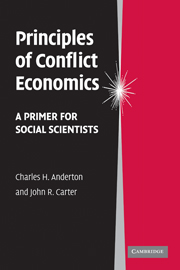Book contents
- Frontmatter
- Contents
- List of Figures
- List of Tables
- Preface
- 1 Introduction: Definition and Scope of Conflict Economics
- 2 Production Possibilities and the Guns versus Butter Trade-Off
- 3 Rational Choice and Equilibrium
- 4 Fundamentals of Game Theory
- 5 A Bargaining Model of Conflict
- 6 Conflict between States
- 7 Civil War and Genocide
- 8 Terrorism
- 9 Geography and Technology of Conflict
- 10 Arms Rivalry, Proliferation, and Arms Control
- 11 Military Alliances
- 12 Conflict Success Functions and the Theory of Appropriation Possibilities
- Appendix A Statistical Methods
- Appendix B A More Formal Bargaining Model of Conflict
- References
- Author Index
- Subject Index
3 - Rational Choice and Equilibrium
Published online by Cambridge University Press: 05 June 2012
- Frontmatter
- Contents
- List of Figures
- List of Tables
- Preface
- 1 Introduction: Definition and Scope of Conflict Economics
- 2 Production Possibilities and the Guns versus Butter Trade-Off
- 3 Rational Choice and Equilibrium
- 4 Fundamentals of Game Theory
- 5 A Bargaining Model of Conflict
- 6 Conflict between States
- 7 Civil War and Genocide
- 8 Terrorism
- 9 Geography and Technology of Conflict
- 10 Arms Rivalry, Proliferation, and Arms Control
- 11 Military Alliances
- 12 Conflict Success Functions and the Theory of Appropriation Possibilities
- Appendix A Statistical Methods
- Appendix B A More Formal Bargaining Model of Conflict
- References
- Author Index
- Subject Index
Summary
Economic analysis of conflict normally rests on either or both of two organizing principles, namely, rationality and equilibrium. Rationality pertains to how actors choose purposefully among alternatives, while equilibrium involves how the choices of different actors are coordinated. We highlight the two principles by reviewing in turn the economic models of consumer choice and supply and demand. Along the way, we explore several issues in conflict economics, including the fungibility of foreign aid and military goods, the ban on land mines, the difficulties of controlling small arms trade, and the liberal peace hypothesis.
Rational Choice Model
Rational choice theory assumes that an actor has consistent preferences over alternatives and chooses from among the best alternatives available. The actor might be a consumer, producer, voter, politician, insurgent, terrorist, nation-state, or any number of other entities. Here we sketch a basic consumer choice model, so we assume that the actor is a consumer. Specifically, we suppose that the consumer chooses among alternative combinations or baskets of two commodities labeled X (say food) and Y (say housing). He operates with a fixed income I per day, which he spends completely on the two commodities at prices PX and PY. His rational choice problem is to choose the most preferred basket that he can afford given his budget. The two basic elements of the problem are then his preferences and his budget constraint, which we can treat separately before combining them to determine his optimal choice.
- Type
- Chapter
- Information
- Principles of Conflict EconomicsA Primer for Social Scientists, pp. 28 - 52Publisher: Cambridge University PressPrint publication year: 2009



